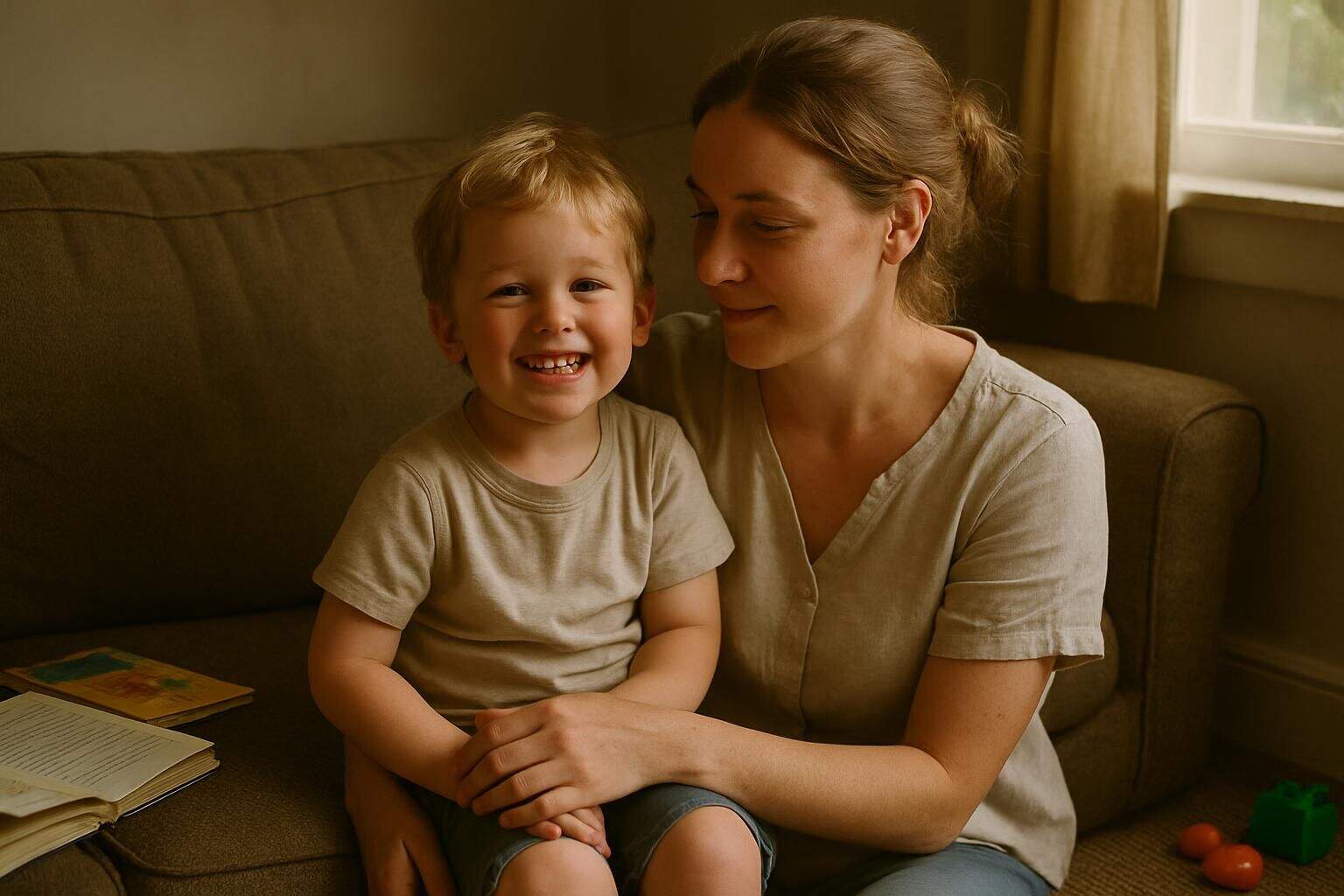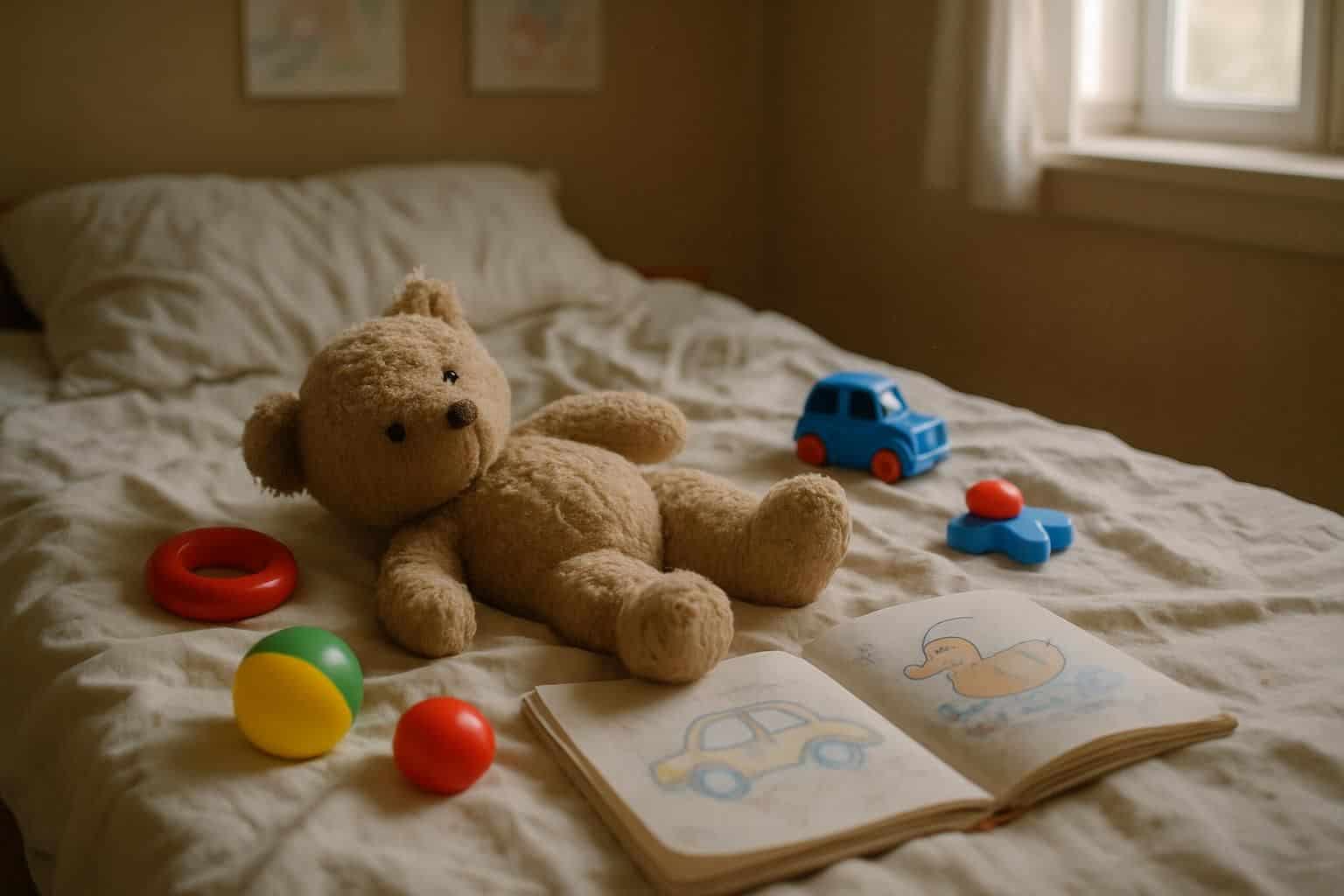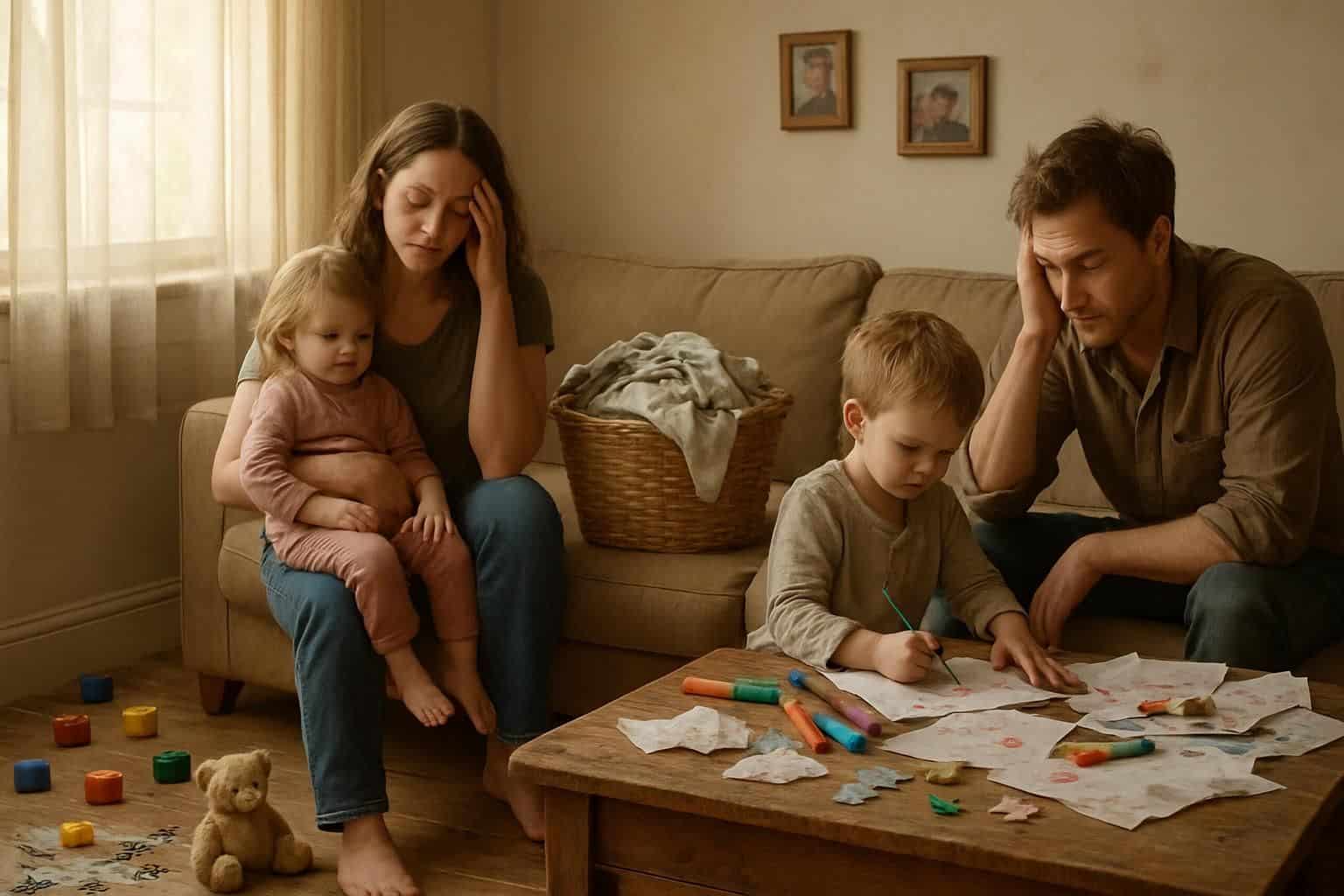Do you often feel anxious or guilty about not being the perfect parent? The idea of the perfect parent is unrealistic and can harm mental health, causing stress and low self-esteem.
This blog will show how shifting to “good enough parenting” can build stronger relationships, more resilience, and happier kids. Keep reading to discover simple steps for raising healthy families without perfectionism.
Key Takeaways
Trying to achieve a “perfect parent” image from social media or magazines increases stress, anxiety, and even depression in many parents today—it’s a harmful and unrealistic standard.
Child expert Donald Winnicott explained the value of “good enough parenting“, emphasizing that kids actually benefit when they see parents make mistakes and then correct them, building important resilience in the process.
A recent survey from 2023 showed 57% of parents felt burned out from chasing parenting goals they simply couldn’t reach, highlighting just how common—and exhausting—this issue has become.
Kids grow best with your presence and attention rather than constant perfection; allowing them to handle minor setbacks and solve problems teaches valuable life skills.
Showing yourself kindness, or self-compassion, matters a lot too—it helps create a happier home where everyone can comfortably embrace imperfection.
Table of Contents
The Myth of the Perfect Parent
Parents chase an impossible dream when they try to do everything right. Social media and glossy magazines show us fake images of family life that nobody can match in real life.
Unrealistic Expectations
Moms today face intense pressure to do everything perfectly—and social media isn’t helping. Most posts only show smiling kids, ideal vacations, and spotless houses—not the chaos families often deal with each day.
Mothers may feel pressured to cook all-organic meals, maintain immaculate homes, perform flawlessly at work, and raise tantrum-free little geniuses. These unrealistic standards quickly create anxiety, stress, and even depression for many parents.
In reality, no parent manages to get everything right all the time—nor should they try. Child development expert Donald Winnicott suggests that “good enough” parenting actually helps kids build better life skills.
Your child benefits most from your affection, attention, and genuine care—not from impeccably decorated birthday parties or school lunches worthy of an Instagram post. For single moms, these pressures can feel even heavier, as they often handle parenting alone.
You can read more about these experiences here: Single mom challenges.
The American Academy of Pediatrics also warns against helicopter parenting. Fixing every little problem for kids prevents them from learning important skills. Facing minor failures helps children develop strength, independence, and confidence.
What works for one child might not suit another, either. Some thrive with clear rules, schedules, and predictable routines. Others might blossom with more space, freedom, and choices.
Rather than aiming for perfection, parents can focus on building genuine connections. Humor can also make parenting challenges feel lighter and more manageable. Kids learn valuable life lessons from watching adults handle mistakes openly and gracefully.
Pressure from Society and Media
Today’s parents face nonstop pressure. Social media floods our feeds with images of flawless families living in spotless homes. Every time I open my inbox, I find ads promising products that claim they’ll make my kids smarter or better behaved.
This creates an unhealthy contest—mothers start comparing children’s grades, sports trophies, and even how neat their homes look. All this pressure brings real anxiety, leaving parents constantly worried they don’t measure up to these unrealistic ideals.
Popular media promotes an imaginary picture of good parenting that doesn’t match real life. TV shows rarely include scenes of tantrums, homework battles, or messy dinners that ordinary families know so well.
Instead, they highlight perfection and constant success. This shapes how we feel about our own parenting methods, affecting how we react to our children’s individual personalities and moods.
A pediatrician once told me something helpful at a primary care checkup: “The parents who worry most about doing it right are often already doing a great job”. Having a good laugh now and then makes coping with parenting stress easier—so does quietly reciting the serenity prayer.
It helps me let go of things I can’t control and stay focused on my real children rather than an imaginary, impossible ideal. If you’re parenting solo, check out resources like solo parenting for additional support.
The biggest trap in parenting isn’t failing to be perfect – it’s believing you should be.
Understanding Good Enough Parenting

Good enough parenting frees you from the burden of perfection while still meeting your child’s basic needs. This approach creates space for growth through normal mistakes and helps kids build their own problem-solving skills.
Donald Winnicott’s Concept of the Good Enough Parent
In the 1950s, British pediatrician Donald Winnicott gave parents a helpful idea—”good enough parenting”. He observed that children don’t need flawless parents to do well. Instead, they simply need caregivers who meet their basic needs most times and respond with care and affection.
Winnicott noticed that small parental slip-ups are actually valuable. Ordinary mistakes help children face life’s ups and downs with confidence.
I’ve personally seen this truth play out, raising three kids myself. On one trip, I accidentally left behind my daughter’s favorite stuffed animal—and bedtime was rough, filled with tears.
Yet, after some struggle, she figured out how to fall asleep without it, discovering her own strength. Kids aren’t looking for perfect parenting, just consistent emotional support and connection.
Imperfect moments, handled with warmth, help families grow closer and teach children resilience. The following section explores why embracing mistakes often makes parenting easier—and even more rewarding.
Embracing Imperfection in Parenting
Perfect parenting isn’t real—and chasing it hurts parents and kids alike. Truth is, your mistakes help your child become stronger and wiser. Being real with your kid teaches them how to handle life’s highs and lows.
A survey from 2023 showed that 57% of parents feel totally burned out from trying to hit impossible parenting goals. Your kid needs someone genuine, feelings and all—not some flawless robot who never screws up.
Good parenting happens when you show your child what bouncing back from mistakes looks like.
The good enough parent is the parent who provides a safe, loving environment while allowing children to experience manageable disappointments.
This realistic style of raising your child creates a deeper bond between you and them. Kids whose parents openly embrace imperfections tend to have calmer, happier personalities. They even learn to laugh when life gets tricky.
The next section looks at how being a “good enough” parent creates stronger family connections than always pushing for some unreal ideal.
Benefits of Being a Good Enough Parent

Good enough parents create a safe space for kids to learn from mistakes. They build trust by showing their own flaws and teaching that real growth comes from small failures.
Strengthening Parent-Child Relationships
Real connections with our kids grow from honest moments—not perfect ones. I’ve seen this happen with my own children. They open up more on days I admit I’ve messed up, rather than when I act like everything’s perfect.
Research backs this up too. It turns out “good enough” parenting helps build trust, because kids feel safer seeing genuine emotions. Your child learns that relationships can handle arguments and mistakes.
Feeling secure is exactly what attachment theory is all about.
Parents who drop the perfect parent routine make room for true, meaningful conversations. My daughter and I started having our best talks once I stopped pretending I knew everything.
Kids who form secure attachments enjoy healthier emotional lives and manage stress more easily. They learn to laugh off small issues and show anger in positive ways. These emotional skills help children deal better with friendships and family interactions for years to come.
Teaching Resilience Through Mistakes
Mistakes can teach our kids valuable lessons. Letting children make mistakes helps them bounce back stronger than before. Experts call this skill “resilience“—the ability to stay strong despite setbacks.
Research finds that kids who learn from their slip-ups become better problem-solvers and feel more confident about themselves. Sure, each child’s personality shapes their reaction to setbacks, but even siblings with different temperaments can learn to see errors as opportunities for growth.
Good parenting doesn’t mean stepping in to fix every little issue. Donald Winnicott introduced the idea of the “Good Enough Parent”, showing us that perfection isn’t the point. Laugh at yourself when things get messy, and be open about mistakes you’ve made.
Doing this shows your child that errors happen to everyone, and they’re not something to fear. Create a home environment focused on effort, not perfect outcomes—and you’ll see your child’s confidence bloom through every lesson learned along the way.
Breaking Free from the Perfect Parent Mentality

The perfect parent trap keeps you stuck in a cycle of guilt and stress. You can break free by shifting your focus to what truly matters for your family’s happiness.
Reframe Your Thinking
Parents sometimes get stuck in unhealthy mindsets about what “good parenting” looks like. These thought loops can steal your joy—but you don’t have to stay trapped. Here’s how to shift your thinking and find more satisfaction in your parenting role:
- Let go of all-or-nothing thinking. Lots of parents fall into the “perfect or failure” trap. Instead of saying, “I yelled today, so I’m a bad mom”, say, “I had a tough moment, but I handled plenty of other situations well”.
- Challenge social media portrayals of parenthood. Those flawless family pictures rarely reflect daily reality. Comparing your day-to-day life with another family’s highlights doesn’t do you—or your kids—any favors.
- Celebrate progress over perfection. Recognize small wins each day, whether it’s making your child laugh or calmly dealing with a stressful episode better than before.
- Cultivate a growth mindset toward parenting. Mistakes can be valuable learning opportunities rather than proof you’re doing something wrong. Child development expert Donald Winnicott found kids learn resilience by seeing their parents make—and then fix—their errors.
- Lean on humor during difficult moments. Laughing together helps you and your kids ease tension and see the lighter side. I once burned dinner badly, but my daughter and I laughed so much it became a funny family memory instead of a parenting disaster.
- Shift your vocabulary from “should” to “could”. Rather than saying, “I should have reacted differently to that tantrum”, think, “I could try another strategy next time”.
- Set achievable goals based on your own family’s needs. Your parenting strategies must match your real-life kids—not an imaginary family from a parenting guide.
- Show daily appreciation for your strengths as a parent. Each day, name three parenting moments you’re proud of—instead of dwelling exclusively on areas you’d like to improve.
Quit the Competition
Stop measuring your family against those flawless social media posts. Over 50% of moms and dads feel exhausted trying to match those polished images online—and that’s just not healthy.
The endless chase drains you and your kids, too. Social media only gives you the highlight reel, hiding the tantrums, messy kitchens, and everyday chaos.
Let go of the urge to prove yourself through fancy holiday setups or your kid’s trophies. Laughing off small disasters beats stressing out over each parenting misstep. The way you raise your kids counts way more than trendy parenting styles or copying someone else’s routine.
You don’t need a “Parent of the Year” trophy—raising happy children who feel loved beats any social media brag. Just enjoy the messy, funny, imperfect adventure of raising your kids your way.
Practical Tips for Good Enough Parenting

Good parenting doesn’t mean doing everything right. You can learn simple tips that make family life easier and more fun for everyone.
Focus on Your Child’s Needs
Kids crave your attention much more than flawless parenting. A lot of parents chase impossible standards, often overlooking what their children honestly need. The psychologist Donald Winnicott introduced the concept of the “Good Enough Parent“—encouraging us to focus more on children’s real needs rather than society’s demands.
Presence matters more to kids than perfection. Children flourish when you pay close attention to their emotions and encourage their growing independence.
Children need our presence more than our presents.
Sit quietly and observe your child playing, without interfering. Pay attention to what makes them smile, laugh, or get excited. Instead of guessing, speak directly to them about their day, asking questions to understand what’s important.
Allowing kids to tackle minor problems on their own helps build resilience and self-confidence. They learn to trust themselves, knowing they can rely on their own skills. Humor helps lighten difficult moments, too—laughing together when things go wrong teaches kids that making mistakes is normal and okay.
Practice Self-Compassion
Self-compassion is essential for raising kids in a balanced way. Moms should show themselves the same care and kindness they naturally give their children. You can’t pour from an empty cup—making time for self care as a mother isn’t selfish; it’s a necessity.
Research highlights that parents practicing self-compassion report lower anxiety and fewer feelings of inadequacy. These parents also foster happier, more positive households, where each family member feels supported.
Having a good sense of humor helps as well! Instead of dwelling on mistakes, laugh them off and be gentle with yourself. Say something kind like “I’m giving this my best”, and ease up on the critical self-talk.
Use the same supportive words you’d offer a close friend. Doing this sets an example, teaching kids how to bounce back from setbacks. Children learn mistakes don’t define their worth.
Your gentle attitude toward yourself sets a tone that encourages everyone at home to feel comfortable with imperfection, instead of ashamed.
How Will the Idea of Good Enough Parenting Evolve in 2025?
By 2025, parenting styles will shift toward greater balance. Parents will move away from chasing perfection, placing mental health for the entire family front and center. Social media will become more honest, showing real-life parenting moments—not just polished posts.
Technology will come through with helpful parenting tools that offer support without judgment. Many mothers, even those who decide to become a single mother by choice, will likely welcome these changes.
Future parenting styles will favor genuine connections, not rigid rules. Schools may start teaching kids about practical, caring family relationships. Parents will become better at setting clear limits but still showing love.
Embracing this way of parenting can help both adults and children feel less anxious about making mistakes. I’ve noticed this myself—in my own family, the days we quit trying to act perfect are often the happiest.
People Also Ask
What exactly is the “Perfect Parent Trap” and how does it impact family life?
The Perfect Parent Trap happens when parents push too hard to do everything “right”—creating stress for everyone in the family. Parents end up chasing impossible ideals, comparing themselves endlessly with others, and feeling guilty about small mistakes. Kids notice this stress, too, feeling pressured, anxious, or worried about disappointing their parents. Instead of happy, relaxed family time, everyone feels stuck, tense, and frustrated—missing out on simply enjoying each other.
How can you tell if a family is caught up in unhealthy parenting patterns?
Watch out for parents who always worry they’re doing something wrong raising their kids. They might constantly check parenting websites, ask everyone’s opinion, or feel guilty whenever they relax or focus on themselves. Kids also show clear signs—they might become anxious, withdrawn, or upset because of impossible standards or hovering parents. If a family seems stressed all the time, exhausted from trying to meet super-high expectations, they might be stuck in unhealthy habits.
How can parents help their families develop more resilience?
Accept that no one is a perfect parent—and that’s totally okay. Let kids face some small challenges on their own, whether that’s settling a minor argument with friends or finishing homework without constant reminders. This grows their confidence naturally, without extra pressure. Creating simple, predictable family routines also helps everyone feel steady and safe during uncertain times—like having a weekly pizza night or bedtime rituals that everyone loves.
Why do the 6 steps matter for family happiness?
The 6 steps offer parents friendly, clear guidance to break away from stressful parenting habits that hurt family relationships. They show simple, practical ways to create a home environment where mistakes just become learning moments—not something shameful or scary. By following these steps, kids and adults alike gain room to grow and enjoy family life, free from endless pressure or worry about being perfect.
